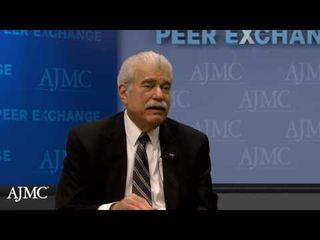
Oncology
Latest News
Study of 1.7 Million Patients Finds Strong Link Between Teenage Obesity, Colon Cancer Risk
Latest Videos

CME Content
More News

Including adjuvant chemotherapy in the postsurgical treatment plan in patients with non—small cell lung cancer (NSCLC) improves survival and is cost-effective compared with surgical resection alone, according to analysis results presented at the 2017 American Society of Clinical Oncology Annual Meeting.

CT-P6, a proposed trastuzumab biosimilar, is safe and effective as a neoadjuvant treatment in HER2—positive early breast cancer, according to research presented at the 2017 American Society of Clinical Oncology Annual Meeting.

Research presented at the 2017 American Society of Clinical Oncology Annual Meeting showed that SB3, a proposed biosimilar to trastuzumab, has comparable efficacy, safety, immunogenicity, and pharmacokinetics to the reference product based on the breast pathological complete response.

After switching studies, research in patients with breast cancer receiving neoadjuvant myelosuppressive chemotherapy has found clinical equivalence between filgrastim and its biosimilar, according to results presented at the 2017 Annual Meeting of the American Society of Clinical Oncology.

This week, the top managed care stories included more twists in Senate Republicans' efforts to repeal the Affordable Care Act; a Medicare fraud sweep targeted opioid distribution; and the CDC reported 30 million Americans now have diabetes.

Social interaction during chemotherapy treatments can positively influence a cancer patient’s health through improving patient outcomes and patient survival rates.

In a webinar hosted by Carevive, researcher Ethan Basch, MD, MSc, discussed the findings of his recent study linking electronic patient-reported outcomes (PROs) to better survival outcomes for patients with cancer.

A poster discussion session at the 2017 Annual Meeting of the American Society of Clinical Oncology led by Katherine Van Loon, MD, MPH, examined retrospective surveillance data in 3 cancers: non—small cell lung cancer, head and neck cancer, and colorectal cancer.

At the 2017 American Society of Clinical Oncology Annual Meeting, oncologists heard from fellow experts on the best way to navigate the daunting challenge of payment reform.

A kickoff session on the first day of the 2017 American Society of Clinical Oncology Annual Meeting in Chicago turned in to a lively discussion on ensuring that the data used to inform patient care and create healthcare policies hold value, which could entail foraging real-world data captured in health records.

According to outcome results presented at a plenary session at the 2017 American Society of Clinical Oncology Annual Meeting, patients receiving routine outpatient chemotherapy for metastatic solid tumors who self-reported 12 common symptoms via tablet computers experienced an overall survival benefit over those who received usual care.

A poster session at the 2017 American Society of Clinical Oncology Annual Meeting presented the trial details of IRONCLAD, a randomized phase 3 study of ibrutinib versus no consolidation following autologous hematopoietic stem cell transplantation for activated-B-cell subtype relapsed diffuse large B-cell lymphoma.

Researchers at the University of Pennsylvania have recognized that narrow provider networks are quite likely to exclude National Cancer Institute—Designated Cancer Centers or National Comprehensive Cancer Network Cancer Centers, which could prevent patient access to high-quality cancer care.

In a recently released position statement, the American Society of Clinical Oncology (ASCO) has outlined a pathway that would address the rising costs of cancer drugs in the United States.

In a late-breaking abstract at the 2017 American Society of Clinical Oncology Annual Meeting, researchers presented an interim analysis of a randomized phase 2 trial of second- or third-line nivolumab, with or without ipilimumab, in patients with second- or third-line malignant pleural mesothelioma.

Three Months of Oxaliplatin-Based Adjuvant Therapy Noninferior to 6 Months in Stage III Colon Cancer
The International Duration Evaluation of Adjuvant chemotherapy (IDEA) collaboration found evidence to support the noninferiority of 3 versus 6 months oxaliplatin-based adjuvant therapy for capecitabine plus oxaliplatin for patients with stage III colon cancer.

In a study performed by the Grupo Español de Investigación en Sarcomas, Fas biomarker detection showed value in predicting progression-free and overall survival after trabectedin administration to patients with advanced soft tissue sarcoma.

The incidence of human papilloma virus (HPV)-positive oropharyngeal cancer can be reduced with a prophylactic vaccine, according to a collaborative study that was presented at the 2017 American Society of Clinical Oncology Annual Meeting in Chicago.

According to findings from a 63-center international study, published in the New England Journal of Medicine, complete lymph node excision may not be essential for improved outcomes in melanoma.

The FDA has approved neratinib (Nerlynx) for the extended adjuvant treatment of some forms of breast cancer, but recommends precautions against the common side effect of diarrhea.

An interim analysis of two phase 2 trials, reported in a poster session at the 2017 American Society of Clinical Oncology Annual Meeting, has found that trabectedin and lurinectedin demonstrated remarkable activity as single agents in BRCA2-associated metastatic breast cancer.

A late-breaking abstract at the 2017 American Society of Clinical Oncology Annual Meeting reported a significant effect on overall and failure-free survival from the addition of abiraterone at the start of androgen deprivation therapy in men with high-risk prostate cancer.

A late-breaking abstract at the 2017 American Society of Clinical Oncology Annual Meeting showed that alectinib demonstrates efficacy and favorable tolerability compared with crizotinib in the primary results of the global phase 3 ALEX study in patients with treatment-naïve advanced anaplastic lymphoma kinase (ALK)-positive non—small cell lung cancer (NSCLC).

LDH Levels Could Predict irAEs Associated With Checkpoint Inhibition and Radiotherapy in Lung Cancer
A study presented by researchers from Massachusetts General Hospital (MGH), which queried the effect of thoracic radiotherapy and immune checkpoint inhibition on the risk of pneumonitis or immune-related adverse events (irAEs), found that radiotherapy did not increase patient risk for pneumonitis and that elevated expression of lactate dehydrogenase (LDH) could be a predictor of grade 2 or higher irAEs.

ARCHER 1050, the first phase 3 head-to-head study of epithelial growth factor receptor (EGFR) tyrosine kinase inhibition, has produced results that demonstrate statistically significant and clinically meaningful improvement with dacomitinib compared with gefitinib (Iressa) as first-line therapy for non—small cell lung cancer (NSCLC) with EGFR-activating mutations.














